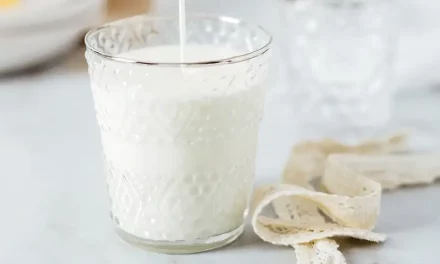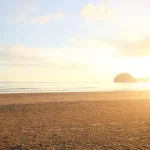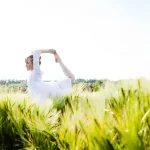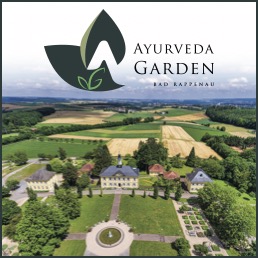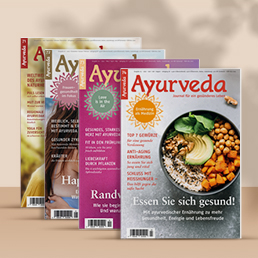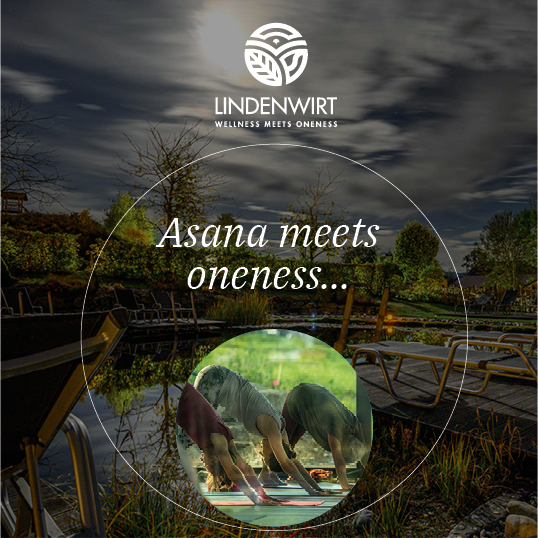Are you familiar with the homeostatic principle? Ayurvedic medicine functions according to that. You function accordingly! It is the principle of equilibrium – introduced and scientifically described by the Harvard pathologist Walter B. Canon some 100 years ago. It means that the organism always strives for a dynamic equilibrium – “prakriti sthapan: preserving the balance” is the name of this natural law in the language of ayurveda.
Whatever happens in our lives, it has an impact on the constellation of the three ayurvedic bioenergies – vata, pitta, kapha – the doshas. Whatever we eat, drink, think, feel, do – it influences these three doshas. Sounds, colours, smells, touches, your work, your partnership, the climate, the time of the day and the season – everything affects them. We have the choice…either we use these influences to strengthen the homeostatic forces in our organism or we ignore harmful signals from inside and outside and allow our regulatory reserves slowly to be consumed. Ayurveda, “the knowledge or science of life”, can help us to recognise and feel what is right for us, what is “satmya” for us.
Usually we take care of this by way of nutrition, remedies, detoxification, stress management or the rhythms of the day and the seasons, but here we want to devote ourselves to something more exotic – our holiday.
Where to go on vacation?
More and more patients tell me that they cannot relax on vacation. Or that the recovery effect only lasts for a short time. What is the reason, why are we in need of rest? Ultimately, always by overtaxing ourselves. As far as our strengths are concerned, we live beyond our capacity. Maybe through professional pressure. Maybe because we want to keep up with our partner, who has the constitution of a bear. Maybe we have to manage multiple stresses from family, household or job or maybe we are caring for a sick family member.
Whatever it may be, the effect is always the same – ayurvedically, we tax vata. To keep the balance, the body tries to control the homeostatic principle with kapha. Once the kapha reserves have been used up, fatigue, exhaustion and complacency grow. We long for a break.
Now, how can we plan our holidays to achieve the necessary recreational effect? The most important law here states that regeneration and rebuilding arise only from rest. Because tranquillity soothes vata and strengthens kapha. Let’s get this right, tranquillity does not mean roasting in the sun all day long. Rest does not mean just sleeping and eating. Rest means balance in everything you undertake. In sleeping, in eating and drinking, in physical and mental activity, in environmental stimuli. All of this relates to our individual situation – to the condition of our doshas and to our disposition.
Which holiday destinations are especially good for the different constitution types or people with specific dosha disorders?
Where should someone who has a vata disorder or a healthy vata-predominant constitution go on vacation? Vata is light, cool, agile, rough, clear and fine. For a holiday, he or she should choose a landscape and a climate with the opposite characteristics. Not a dry steppe landscape, but a juicy green, lush environment with lots of water and forests, not cold and windy, but warm (not hot), a
bit wet and sunny. So, for example, in a gentle landscape such as you would find in Bavaria, Austria or Switzerland.
Where then should the pitta guy or the stressed manager with a pitta disorder spend his holidays? Pitta is light, hot, slightly oily, spicy, fluid, agile and sour. The climate and the influence of the landscape should balance out these qualities. Best avoid midsummer in Tunisia, but rather choose the slightly cooler Scandinavia. A lush green landscape with lots of forest and water benefits a vata as well as a pitta person. Even a winter holiday in the snow is suitable for this type of constitution or cools off a pitta surplus.
The kapha human or the overweight diabetic with a kapha disorder must balance the qualities heavy, cold, oily, viscous, firm, soft and sweet. A holiday on a rough, windy coast at a time when it’s not cold would help him or her. Another way to avoid humidity is to take a vacation in a hot, dry landscape or in the mountains.
If you need to unite different tendencies in a family or a group, then plan something that will do everyone good: nothing extreme, not too hot and not too cold, not too humid and not too dry, not stormy and rough, but gentle and still. Wherever you go on holiday, give your organism tranquillity, so that the “doctor in you”, your body intelligence, can quietly do its work. If you feel fresh and vital, in a good mood, cheerful, balanced and optimistic on your return from the holidays, if after two weeks this feeling of well-being remains, if you like to think back to your vacation, then you have made good use of the time for regeneration.

 Natalya Zaritskaya on Unsplash
Natalya Zaritskaya on Unsplash 


